
In each of the website series, we pose the issue and then offer perspective and tips from an expert. The #motherrunner + the expert will then discuss the situation and thoughts on an Another Mother Runner podcast: the two episodes will air on April 26 and May 3.
Because we don’t want to leave them—or you—hanging we will then follow up with the #motherrunners on posts the week of June 24 and a podcast on June 28 to see how integrating the expert tips + perspective worked for them.
WEIGHTY MATTERS:
AMANDA AND STRUGGLING WITH GRACE
This popped up on the Many Happy Miles Facebook page, and Amanda’s perspective brought up empathy and connection.
Struggling with grace right now. My husband and I went to a charity auction last night, I got dressed up, did my hair and makeup, pulled on my spanks, and felt great despite wearing heels that were way too high.
My husband was amazing and stretched our budget and we got tickets to RENT on my dad’s birthday (he passed away 4 years ago from brain cancer). It was a great night, with awesome friends.
Today… I looked at my pictures, and all I can see is my extra chub. I know that this body gave birth to 3 beautiful girls. I know this body works hard to provide for our family every day. I know this body has trained and done hard things. I just want this body to look something like the pre-mom me remembers. I will never be my 25-year-old self, and I don’t aim to be, but I do want to feel comfortable in my skin and I just don’t know how to get there.
Thanks for letting me have a pity party. Thankfully the sun is shining and the snow is melting.
Amen. [source]
THE EXPERT WEIGHS IN:
“This is tough stuff because body image isn’t objective and rational, even for those of us who study it,” says Charlotte Markey, Ph.D., professor of psychology at Rutgers University (Camden) and a co-editor of Body Positive: Understanding and Improving Body Image in Science and Practice, “We live in a society that values beauty, youth, thinness, and that works against all of us women, especially as we age. I applaud Amanda for speaking up—we don’t do each other any favors by pretending we’re satisfied with our bodies and unconcerned with these issues.”
Here, Charlotte offers insight and some tips when all you can see is chub:
Consider the source. We are our own worst critics; most of us can’t see ourselves how other people see us. We give our friends, colleagues and family genuine compliments and grace, and yet we turn around and dwell on our droopy breasts or chunky legs. When that happens, ask yourself, “Would my friend say this to me? Would I say this to a friend?” The answer is no. (If it’s not, you might need new friends.) Then do your best to remove your harsh-lensed glasses and switch your focus.
Lose the thick-skinned mentality. Although the just-do-it perspective invades all cracks of the fitness world, research indicates that talking to yourself with compassion and kindness is much more effective when it comes to achieving goals and an overall sense of wellness. That doesn’t give you a pass to forgo exercise, of course, but instead of saying, “Why can’t you run faster?” focus on how strong and capable your legs feel and cut yourself some slack on the days when you just can’t get to the gym.
Write it out. When you get that ugh feeling as you study yourself in a mirror or a picture, take a moment and either mentally make or physically write a list of three things related to your body for which you are grateful. It could be that it produced healthy children or ran a half-marathon or that you have strong shoulders or shapely calves.
FACE it. Use the acronym FACE for social media, a medium that can bring on self-criticism in one quick swipe. Although I drafted this for teenagers, it’s just as useful for parents of teenagers:
F: Filter (aka protective filtering)
Set boundaries on who and what you follow. If there’s a friend or celebrity on Instagram or Facebook that consistently makes you feel lesser than, unfollow or defriend them. Similarly, following more body positive accounts can be helpful: BodyPosiPanda and The Body Positive, a Berkeley, CA Institute are two good ones.
A: Avoid
A step further than Filter, it seems that taking a social media hiatus regularly has plenty of worthwhile benefits.
C: Careful of Comparisons
Although we all innately compare ourselves, remind yourself, as you look at Gwen Stefani or any other celeb/influencer type that it is her job to look good all the time. That is likely not your job. And even for us mere mortals, remember that a professional photographer plus adjusting every aspect of a picture can make anybody look more skinny/beautiful/luminescent/fill in the blank than they do in everyday normal life.
[Quick sidebar on comparisons: We’re also prone to compare our current selves to ourselves 10 or 20 years ago. Pictures make it easy to remember the physical parts of your age—jeans may have been smaller—but try to remember your state of mind, your relationships and friendships, and other areas not so tangible. Frankly, there are a lot of good things about being older.]
E: Evaluate
This is a nod, once more, to reminding yourself that the pictures we see on social media are not the stuff of life. It’s easy to objectively remember that when you’re feeling good about yourself; harder when you’re feeling blah and judgmental.
Work with what you have. Fashion trends can be terribly unkind to all female bodies, let alone those who have given birth and/or might be nearing midlife. If you’re not having any luck finding jeans or running shorts that work for you, focus on skirts or another workaround that will. And this is a bit of a splurge, but going to a stylist (Nordstrom has free stylist services) or using a service like Stitch Fix may help you find flattering clothing you wouldn’t consider on your own.
Consider those you influence. Expectations can change from generation to generation, but only if we’re aware and proactive about it. If you have children—and especially girls—ask yourself what kind of behavior you are modeling. Don’t comment on your clothing, don’t say, “I look fat”, don’t think that you have the luxury of critiquing your body in front of them without it influencing how they see themselves. You don’t.
Lean out. If the thoughts are more pervasive than fleeting, consider getting involved in something beyond your normal routine of work/family/home. What cause or issue are you passionate about? Whether you’re charged up about a political issue or want to help homeless cats, spending your energy outward is much more valuable, both for yourself and the world at large, than focusing it inward.
Talk it out. Having a chat with a girlfriend can be therapeutic. Simply acknowledging it—“I know I gained weight over the holidays and it’s driving me crazy,”—and talking through can give perspective; just don’t turn it into what I call maladaptive girl conversations, where the subject dominates everything. Similarly, a therapist can be a great sounding board. Having somebody outside your family and social circle helping you sort through your thoughts is definitely a good choice when you’re having trouble quieting them on your own.
Finally, take a clue from Amanda and her last line: The sun is shining and the snow is melting. Casting your focus outward and on positive things is always helpful, as is getting out into nature. A recent 2018 study out of London found that spending time in nature can nurture more self-compassion. Spending time in a natural setting “may provide people with cognitive quiet, which in turn may foster self-compassion,” the researchers write. What better reason to head out for a walk or run in your local park, and thank your body for the strength and movement it provides.


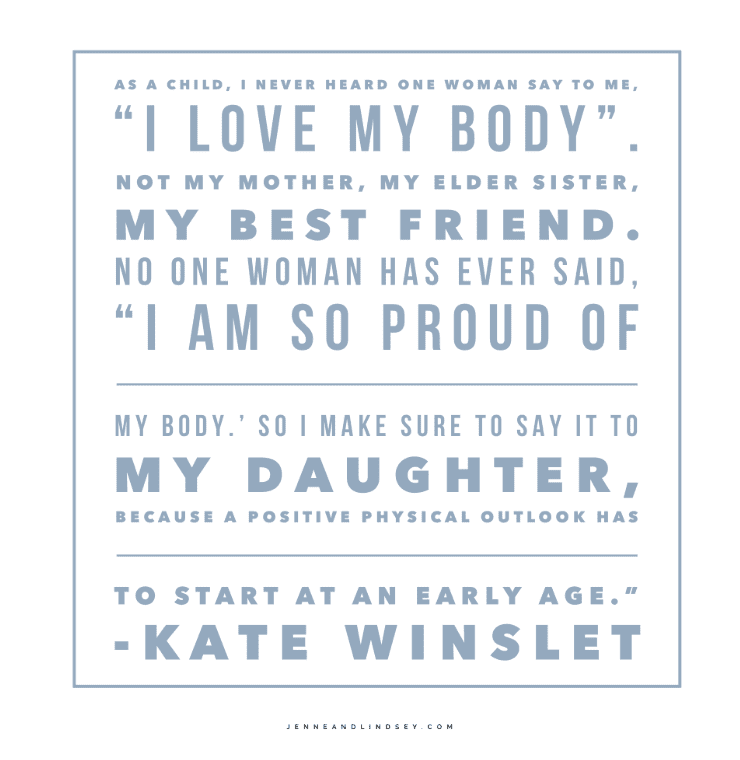
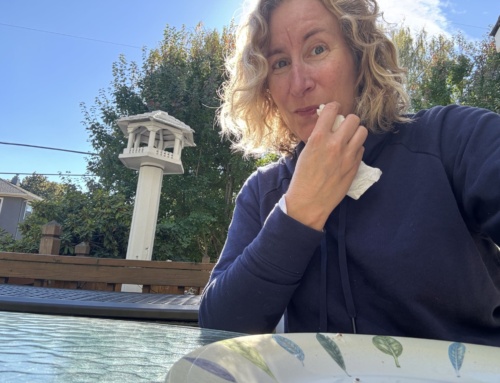
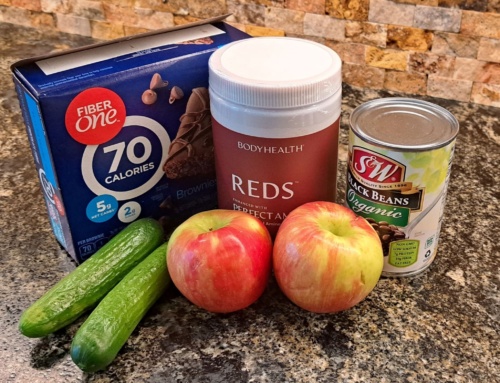
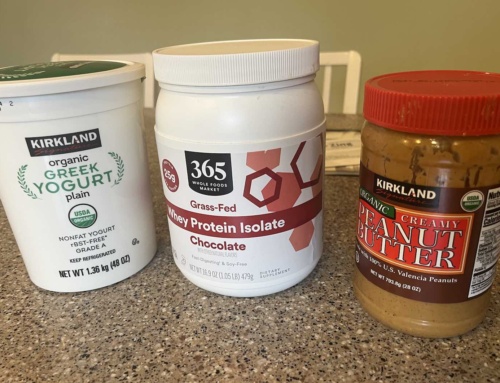
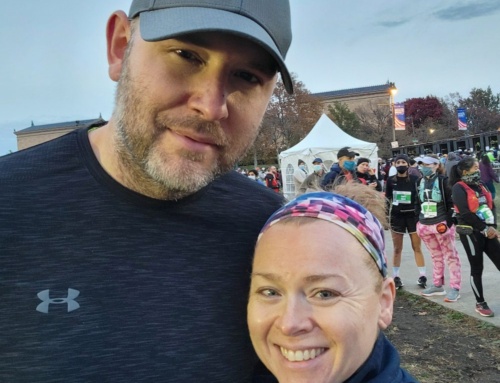
I’m 66. I have age spots, loose skin where muscle used to be and a huge varicose vein on the back of one of my legs. My preschoolers play with the skin on my neck and the creases around my mouth are never going away unless I invest in huge amounts of “filler”- which I surely can’t afford and would make me feel like a Kardashian poser. I am up today at 4:30 to get my swim in. I hope to go 3000 yards which is almost 2 miles, in preparation for my 10th swim from Alcatraz. I completed a 20 mile mountain bike ride yesterday after traveling back from spending a week with my 92 yr. old mom, taking her to appointments, raking her yard, cleaning her house and just making sure she didn’t fall down the stairs. That is my sister’s daily reality currently. The roads and trails and bodies of water could care less about what you look like but are there to help you pretend you younger than you are, stronger than you perceive and appreciative that you still woke up this morning, got dressed and got out the door to do something you love to do and made you feel alive. I am surprised that women are still going through these things with all the support and opportunities women have these days. You have your own workout clothing, shoes, magazines and support groups ad-nauseum to help you do what you want to do. I didn’t. I didn’t get to be on a “team” in High school- so I created one. I didn’t get to run with a lot of other women, so I sucked it up and ran with the guys. I couldn’t find any other women to ride with, so I rode with guys. I was one of a few in the ultra runs I competed in, but I did it anyway and kept those few women that did get accolades and press in my radar to be more like them. Just do what you love, don’t care about what others “think” and it won’t be so hard.
I struggle with this a lot – this series is really hitting home. Throughout my life, I’ve loved my curvy body, which has never looked like the current societal ideal. Now that I’m firmly in middle age, I still like my profile from the front – until I turn and see how thick my middle has become. There are days when I feel great, full of pride and satisfaction at the training this body has done, the childbearing, and shape I’m in for my age. And there are days when nothing in my closet flatters, and I can’t believe that body in the mirror is mine, and logical reminders make no difference. Commiserating with girlfriends or my husband – or just plain filling my brain with other things until the mood passes are what usually works to get me through those days.
What I do know is when I hear my mom, now in her mid-70s, bemoaning her weight and that her walking regimen isn’t doing enough, that she’s still dieting, I think, “I don’t want that to be me.” Attention to the balance of calories in and out is always wise, but all things in moderation! Each decade of life has brought more self-awareness and different kinds of self-acceptance. Loving myself, flaws and all, is often a struggle but one that is so worth the fight.
I doubt that any woman is ever free from that self-doubt regarding beauty. I’m 30 years old, mom of a toddler, I love living in sweats if I’m at home, and I do not feel beautiful most days. I’m not at my current weight goal but I’ve learned that focusing on weight loss causes me to feel extremely negative. So I’m working on focusing on my strengths. Like, “Woohoo! I woke up early to get a run in. Well done, me!” And yet, I still have the tendency to focus on that outer beauty standard. I took a selfie during a recent nine mile run, and afterward all I noticed was how chubby I looked. But then I thought, Who cares? I just ran nine miles! Those chubby cheeks were from me beaming with pride! Thinking about any weight gain, or trying to lose weight is not going to make me happy; instead I choose to focus on what my body can handle. It is training for a half marathon, it will finish a half marathon and I will run another one.
I think this series hits home for a lot of us. I just watched Brene Brown’s show on Netflix and she said the #1 source of shame for women was body image. When I heard that I thought “wow, what bs.” How many years of how many women’s lives have been wasted by feeling ashamed of perfectly good bodies? Myself included! How did we let societal expectations do that to us? I’m 56 now, feel pretty good about where my body is but realize my cheeks will always be chubby and the older I get, the more I think, hey, maybe those bad boys actually make me look younger! Also, I was watching video of our family from 20 years ago when my kiddos were toddlers. I’m sure I weighed 20lbs more then than I do now and was really spending too much time worrying about those 20 lbs- but all I could think of NOW was, hey-you were lovely, you were kind to your kids and you DID NOT look fat. I so wish I hadn’t devoted so much negative energy to thinking I wasn’t good enough. I definitely feel like I eat healthier now but I really want to try to not ever feel shame around my body again!